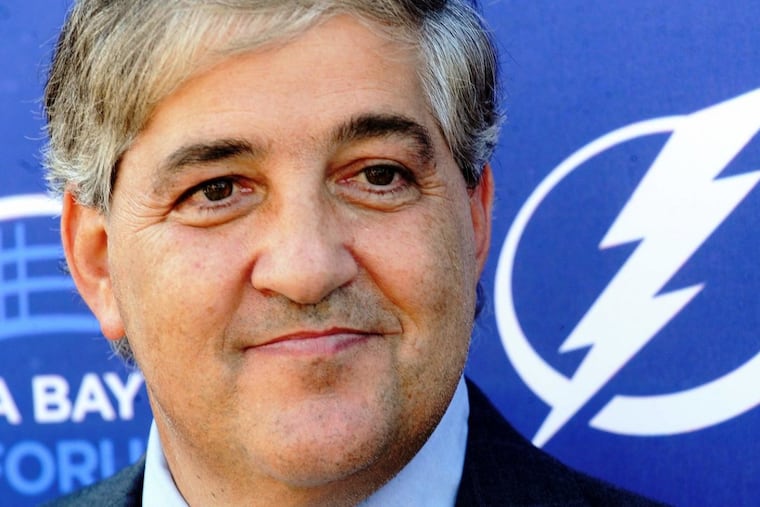Philly tech angel DreamIt expands to Florida
"We started out dating," says investor Jeff Vinik, referring to DreamIt Ventures. "I'm happy to say we're married now."

DreamIt Ventures, the tech company "accelerator," has helped 300 software and health tech companies since it was founded in Philadelphia 10 years ago. It expanded to New York in 2011, and now is setting up a third base in Florida, thanks to a $12 million investment from stock, pro sports and real estate investor Jeffrey Vinik.
"This is something we need in Tampa to up our game," says Vinik, a North Jersey native who ran Fidelity Magellan when it was the largest U.S. stock mutual fund in the mid-1990s. He quit to run a hedge fund, and has become a Florida real estate developer since buying the Tampa Bay Lightning of the National Hockey League in 2010.
The Tampa area, whose population is almost half as large as metro Philadelphia's, grew nearly five times faster from 2010 to 2016, the U.S.Census estimates. Even Philadelphia's iconic Wawa has opened stores in Tampa.
The region is also a university center for engineering (University of Tampa), management (University of South Florida) and other tech-ready graduates, Vinik notes. But he and his partners believed that it needed a tech "eco-system" so start-ups can take root, enabling young engineers to stay home after finishing school instead of moving to the Northeast or West Coast. DreamIt will help build that, Vinik told me Monday.
Vinik's cash infusion bought him a role as DreamIt's newest partner and board member, alongside a started-in-Philly group that includes DreamIt cofounders David Bookspan, who started retailing-software developer Monetate; Mike Levinson of cloud-based application developer WizeHive; and Steve Welch, who founded valve-maker Mitos Technology and Restore Cryotherapy, ran for Congress in suburban Philadelphia, and then relocated to Texas.
The new partner met the DreamIt team, led by Avi Savar and managing partners Steve Barsh and Darren Sandberg, in 2016, when Vinik and his Tampa developer colleague Jim O'Connell were hunting for tech company advisors to help mentor nascent Tampa software firms.
The Tampa boosters recruited DreamIt, which has a record of running regional programs for start-up clusters around the U.S., to help set up what they called the "UrbanTech vertical" program in Tampa last year. Vinik said that initial program showed how DreamIt can help small firms raise capital and set up management and sales operations; the company's DreamIt Ventures investment affiliate typically buys a stake in firms that the group backs.
"As I got to know them better, I became extremely impressed with their vetting of companies, the details of their accelerator programs, and how happy the companies were," Vinik told me. "We started out dating. I'm happy to say we've gotten married now."
Vinik plans to make DreamIt's new office a fixture in the $3 billion Water Street Tampa development that Vinik is building in partnership with Cascade Investment LLC. Cascade is owned by Bill Gates, cofounder of Microsoft.
Vinik became a national figure during the 1990s, a time when celebrity stock-pickers such as his predecessor Peter Lynch and Philadelphia's John Neff, who managed Vanguard Group's Windsor stock fund, bought big-company stocks for investors rushing into the bull market.
Such "active" investing funds have suffered since the 2001 dot.com stock crash and the rapid speed-up of trading information through digital investment systems, making it tough to beat low-cost funds indexed to the Standard & Poor's 500 and other market benchmarks.
Vinik says large and sophisticated investors have moved on from publicly traded stocks to private companies, including software and biotech startups, and now spend a lot of time tracking tech-firm founders and mentors who show promise turning capital into profits.
"That generally comes down to the people,"Vinik added. "I'm involved in a lot of private investments. It's a big hurdle to go into business with anybody." After "hundreds" of visits and long phone calls, he says, he's convinced that "at DreamIt the board members and the executives and the business model and the worthy objectives are really impressive. This will help our development and the whole innovation system in Tampa Bay."
Barsh, DreamIt's managing partner, called Vinik "a visionary." Companies backed by DreamIt include Adaptly, Biomeme, Eko Devices, HouseParty, LevelUp and Raxar. The company says the 300 companies it has "accelerated" have so far raised more than $800 million in venture capital.